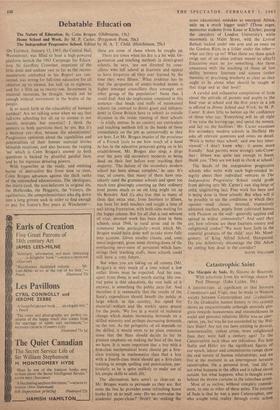Catastrophic Saint
The Marquis de Sade. By Simone de Beauvoir. With selections from his writings chosen by Paul Dinnage. (John Calder, 30s.) A DISTINCTION, as significant as that between Commissars and Yogis,, may be made in Western society between Catastrophists and Gradualists. To the Gradualist human history in this century shows an unquestionable although unsteady pro- gress towards humaneness and reasonableness in social and personal relations. Hitler was an aber- ration, yes, but was he not succeeded by the Wel- fare State? Are not our laws relating to divorce, homosexuality, violent crime, more enlightened than they were half a century ago? To the Catastrophist such ideas are ridiculous. For him Stalin and Hitler are the significant figures of our epoch, labour and concentration camps show the real nature of human relationships, and we live at the moment in an interregnum between catastrophes. On a personal level, 'real life' is not what happens in the office and is talked about outside, but what happens, what is thought even, behind the drawn curtains in the suburban street.
Most of us incline, without complete commit- ment, to one or other of these poles. The interest of Sade is that he was a pure Catastrophist, one who sought total reality through erotic action and writing, and interpreted society wholly by this light. His eroticism became, Mme de Beauvoir says, 'a challenge to society' when he tried to justify philosophically his words and actions. The ultimate realities for him were rape and murder, the ultimate errors belief in God (The idea of God is the sole wrong for which I cannot forgive mankind') and adherence to the law. 'He approves of the vendetta, but not of the courts,' Mme de Beauvoir says, and Sade him- self : 'The reign of law is inferior to that of anarchy.' There is no illogic in the fact that during his decade of freedom at the end of the eighteenth Century, and his participation in the French Revolution, he was opposed to the death penalty and shocked by its use during the Terror.
All this is anathema to Gradualists, but the question with which Sade confronts them is: Do not these ideas conform more nearly than those of gradual progress to the reality of human relationships?' Mme de Beauvoir, who is herself a thoroughgoing Catastrophist (I suppose I should declare my own interest on this side too), says that, In order to escape the conflicts of existence, we take refuge in a universe of ap- pearances, and existence itself escapes us.' All of us do this more or less, more in some periods than in others. The years of the French Revolu- tion, in which Saint-Just could say, 'Nothing re- sembles virtue more than a great crime,' were favourable to extreme Catastrophic thought, and both in his life and writings Sade did not flinch from the ethical conclusions to which his nature led him. Those who regard what he wrote wholly as erotic fantasy should consider the realities of the concentration camps, or even attend a session or two at the Old Bailey.
Sade believed, as Mme de Beauvoir ironically says, that 'the penis is the shortest path between two hearts.' Her brilliant, badly-organised essay should convince those who need conviction that he was a revolutionary thinker, and that his thought has a particular relevance to our own time and situation. We should not burn Sade, then, but there is not much necessity to read him In bulk either. The pleasures his books offer are almost wholly pornographic, his group orgies and tortures are endlessly and wearisomely re- peated, and they are often comic. The selections In this book do not give at all adequately the flavour of Sade, but they do convey something of his absurdity. In Juliette the furniture in the castle of the giant Minski is made up wholly of naked girls who provide armchairs, sideboards, and even chandeliers. The food is appropriate. AMY husband plunged his fork into a gammon of boy that seemed to him to be done to a turn, and after helping at least two pounds on to his Plate, he ate it.' Sade was a kind of Catastrophic saint, and like all saints he was often ridiculous.
JULIAN SYMONS



































 Previous page
Previous page